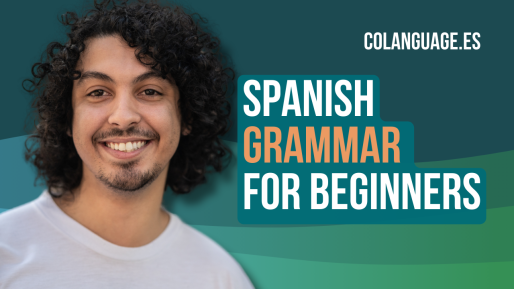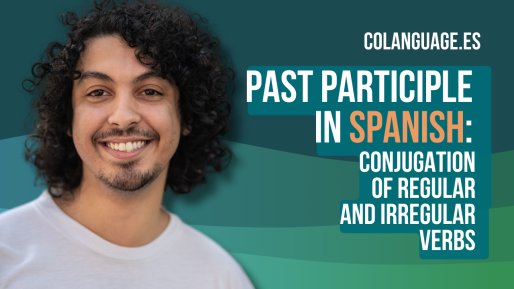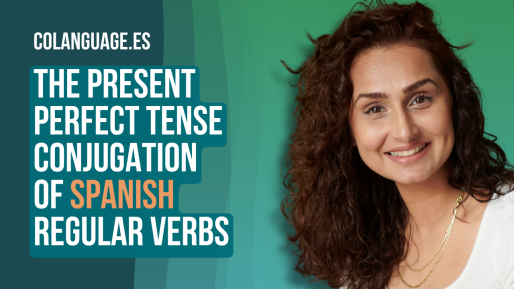Past perfect tense: conjugation of Spanish regular verbs Share Copied!
Spanish
Learn the past perfect tense in Spanish (also called the pluperfect). Find exercises, audio and book additional conversation classes with a teacher!
Video
Podcast
What is the past perfect tense?
The past perfect tense, sometimes called pluperfect, is used to describe actions that happened before another action in the past or had been true at a certain point.
-
Habíamos vivido en España antes. (We had lived in Spain before.)
-
Ella había decidido decírselo. (She had decided to tell him.)
How to conjugate the past perfect?
The past perfect in Spanish is formed by conjugating the auxiliary verb "haber" (to have) in the imperfect tense, followed by the past participle of the verb you are conjugating.
Past perfect = "haber" (imperfect tense) + verb (past participle)
The past perfect tense of Spanish verbs ending in "-ar"
The past perfect tense is formed with the conjugated auxiliary verb "haber" in the imperfect tense followed by the past participle of the main verb. With verbs ending in "-ar", the participle ends with "-ado".
Conjugation of "preguntar" (to ask)
The following tables includes the full conjugation of the verb "preguntar" (to ask) in the past perfect.
| Personal pronoun | Spanish | English |
|---|---|---|
| Yo (I) | Yo había preguntado sobre la tarea antes de la clase. | I had asked about the homework before class. |
| Tú (You) | Tú habías preguntado acerca del horario. | You had asked about the schedule. |
| Él/Ella (He/She/It) | Él había preguntado a su jefe sobre la reunión. | He had asked his boss about the meeting. |
| Nosotros/-as (We) | Nosotros habíamos preguntado a los vecinos por la dirección. | We had asked the neighbours for the address. |
| Vosotros/-as (You) | Cuando llegó el camarero, vosotras ya habíais preguntado por el menú a su compañera. | When the waiter arrived, you had already asked his colleague about the menu. |
| Ellos/-as (They) | Ellas habían preguntado a los profesores sobre el examen. | They had asked the teachers about the exam. |
The past perfect can be used to express an action that happened before another event in the past.
Cuando llegó el camarero, vosotras ya habíais preguntado por el menú a su compañera.
(When the waiter arrived, you had already asked his colleague about the menu.)
Listening exercise
This dialogue shows the conjugation of "-ar" verbs in the past perfect tense.
| Spanish | English | |
|---|---|---|
| Daniel | ¿Te diste cuenta de que Alex no vino a la reunión de la tarde? | Did you notice that Alex didn't come to the afternoon's meeting? |
| María | Sí, le había preguntado por la mañana y me dijo que tenía una cita médica. | Yeah, I had asked him in the morning, and he said he had a medical appointment. |
| Daniel | Yo también le había preguntado, pero no me mencionó la cita. | I had asked him too, but he didn't mention the appointment. |
| María | Supongo que no quería preocupar a todos, pero ya le habíamos preguntado con antelación. | I guess he didn't want to worry everyone, but we had already asked him ahead of time. |
With verbs ending in "-ar", the participle ends with "-ado".
The past perfect tense of Spanish verbs ending in "-er"
The past perfect tense of verbs ending in "-er" is also formed with the auxiliary verb "haber" in its conjugated past perfect form and the main verb in the participle. For verbs ending in "-er", the participle ends with "-ido".
Conjugation of "correr" (to run)
The following tables includes the full conjugation of the verb "correr" (to run) in the past perfect.
| Personal pronoun | Spanish | English |
|---|---|---|
| Yo (I) | Yo ya había corrido diez kilómetros antes de la carrera. | I had already run ten kilometres before the race. |
| Tú (You) | Tú habías corrido más rápido que nunca en esa competición. | You had run faster than ever in that competition. |
| Él/Ella (He/She/It) | Ella ya había corrido la maratón cuando decidí unirme. | She had already run the marathon when I decided to join. |
| Nosotros/-as (We) | Antes de que comenzara a llover, nosotras habíamos corrido por el parque. | Before it started to rain, we had run through the park. |
| Vosotros/-as (You) | Vosotros ya habíais corrido varias veces esta ruta antes. | You had run this route several times before. |
| Ellos/-as (They) | Ellos habían corrido más lejos de lo planeado. | They had run farther than planned. |
You use the past perfect to describe actions that were ongoing before another event in the past.
Antes de que comenzara a llover, nosotras habíamos corrido por el parque.
(Before it started to rain, we had run through the park.)
Listening exercise
Here, the past perfect tense conjugation of "-er" verbs is practised in a dialogue.
| Spanish | English | |
|---|---|---|
| Daniel | ¿Habías corrido alguna vez en un parque antes? | Had you ever run in a park before? |
| María | No, solo había corrido en la cinta de correr del gimnasio. | No, I had only run on the treadmill at the gym. |
| Daniel | Te entiendo. Antes de mudarme a España, yo nunca había corrido fuera por el frío y la lluvia. | I get you. Before moving to Spain, I had never run outside because of the cold and rain. |
For verbs ending in "-er", the participle ends with "-ido".
The past perfect tense of Spanish verbs ending in "-ir"
The past perfect tense of verbs ending in "-ir" is also formed with the auxiliary verb "haber" in its conjugated past perfect form and the main verb in the participle. For verbs ending in "-ir", the participle ends with "-ido".
Conjugation of "compartir" (to share)
The following tables includes the full conjugation of the verb "compartir" (to share) in the past perfect.
| Personal pronoun | Spanish | English |
|---|---|---|
| Yo (I) | Yo ya había compartido mi comida antes de que llegaras. | I had already shared my food before you arrived. |
| Tú (You) | Tú habías compartido tus ideas en la reunión. | You had shared your ideas in the meeting. |
| Él/Ella (He/She/It) | Cuando llegué a la clase, el profesor ya había compartido sus conocimientos sobre biología. | When I arrived at class, the teacher had already shared his knowledge about biology. |
| Nosotros/-as (We) | Nosotros habíamos compartido nuestras preocupaciones. | We had shared our concerns. |
| Vosotros/-as (You) | Antes de mudaros juntos, vosotros ya habíais compartido muchas experiencias. | Before moving in together, you had already shared many experiences. |
| Ellos/-as (They) | Antes de la boda, ellos habían compartido su alegría con la familia. | Before the wedding, they had shared their joy with the family. |
The past perfect tense of verbs ending in "-ir" is formed in the same way as verbs ending in "-er".
Listening exercise
This dialogue demonstrates the past perfect tense conjugation of verbs ending in "-ir".
| Spanish | English | |
|---|---|---|
| Daniel | ¿Habías compartido alguna vez tu ropa con alguien más? | Had you ever shared your clothes with someone else? |
| María | No, nunca había compartido mi ropa con nadie. ¿Y tú? | No, I had never shared my clothes with anyone. And you? |
| Daniel | Sí, muchas veces. Antes de ser adolescente, mi hermana y yo habíamos compartido todas nuestras prendas. | Yes, many times. Before being a teenager, my sister and I had shared all our clothes. |
Key takeaways
Here is a quick summary of this lesson.
- The past perfect tense is formed with the conjugated auxiliary verb "haber" in the imperfect tense followed by the past participle of the main verb.
- The past perfect is used to express an action that happened before another event in the past or or that had been true at a certain point.
Subscribe to our social media channels to get free daily exercises!



